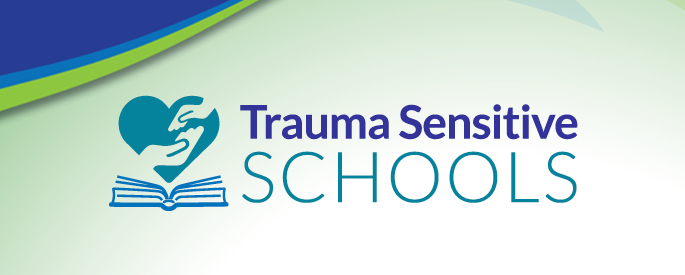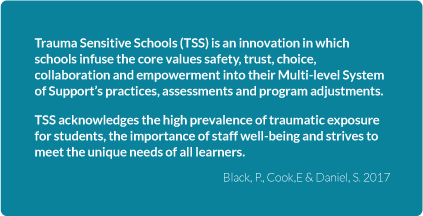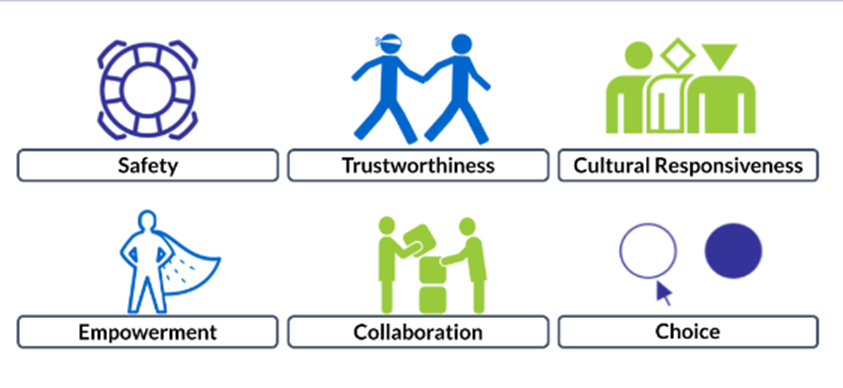
Wisconsin’s Trauma Sensitive Schools Initiative

Exposure to traumatic events in childhood is extraordinarily common. Although not all exposure to trauma leads to difficulty in functioning, research tells us that exposure to trauma and toxic stress changes people. Just as a physical assault on the body can cause bodily impairment, psychological trauma can result in a mental injury that impacts such things as a child’s ability to regulate emotions, attend to classroom activities, and/or achieve typical developmental milestones.
Schools have a great ability to prevent and mitigate the impacts of traumatic exposure on our youth. By becoming a trauma sensitive school, schools can become a protective factor for these students and increase the social and emotional and academic skills of the entire school body.
Trauma sensitive schools is a process, not a product. Strategic and thoughtful implementation is critical to ensure successful implementation. Using the principles of implementation science, DPI has worked to create an Online Professional Learning System to help support schools as they embark on the transformative process of becoming a TSS.
The TSS Professional Learning System is meant to integrate into your existing equitable multi-level system of support (EMLSS) to promote maximum sustainability and to ensure the implementation is meaningful and manageable.
The TSS theory of change is explained below:

Wisconsin’s trauma sensitive schools model includes six guiding principles: safety, trustworthiness, cultural responsiveness, empowerment, collaboration, and choice. The handout below provides an overview of each guiding principle.
Wisconsin’s Trauma Sensitive Schools Guiding Principles

Trauma Sensitive Schools Implementation Stories
This video series, created in partnership with the Wisconsin Safe and Healthy Schools (WISH) Center, features educators and regional partners who are leading trauma sensitive schools work in their schools, districts, and regions. In each video, these leaders share specific strategies, action steps, and mindsets that guide the establishment and growth of trauma sensitive schools across Wisconsin.
- Sharing our Trauma Sensitive Schools Story: CESA 5
-
Alissa Darin talks with Chris Boettcher of CESA 5 about how she supports schools in her region in becoming trauma sensitive through building capacity, embracing small wins, and empowering students.
- Sharing our Trauma Sensitive Schools Story: CESA 11
-
Alissa Darin talks with Erin Baillargeon of CESA 11 about how she supports schools in her region in becoming trauma sensitive through helping schools apply a trauma sensitive lens to academic and behavioral initiatives and helping educators shift mindsets about trauma’s impact on students and their learning.
- Sharing our Trauma Sensitive Schools Story: Howe Elementary School
-
Alissa Darin talks with Amy Kallioinen and Christina Gingle as they share how they implemented trauma sensitive practices into minds, hearts, and school culture at Howe Elementary School through integrating trauma sensitive practices into social-emotional learning, including regulation strategies and culturally responsive practices
- Sharing our Trauma Sensitive Schools Story: Hudson Middle School
-
Alissa Darin talks with Chelsea Bellville about how the implementation of trauma sensitive practices at Hudson Middle School has changed the school’s culture and climate to be more supportive and positive.
- Sharing our Trauma Sensitive Schools Story: Ellsworth School District
-
Alissa Darin talks with members of the Ellsworth School District Trauma Sensitive Schools Team as they share how their schools prioritized a team approach, professional learning, and staff wellness for their focus areas of trauma sensitive implementation.